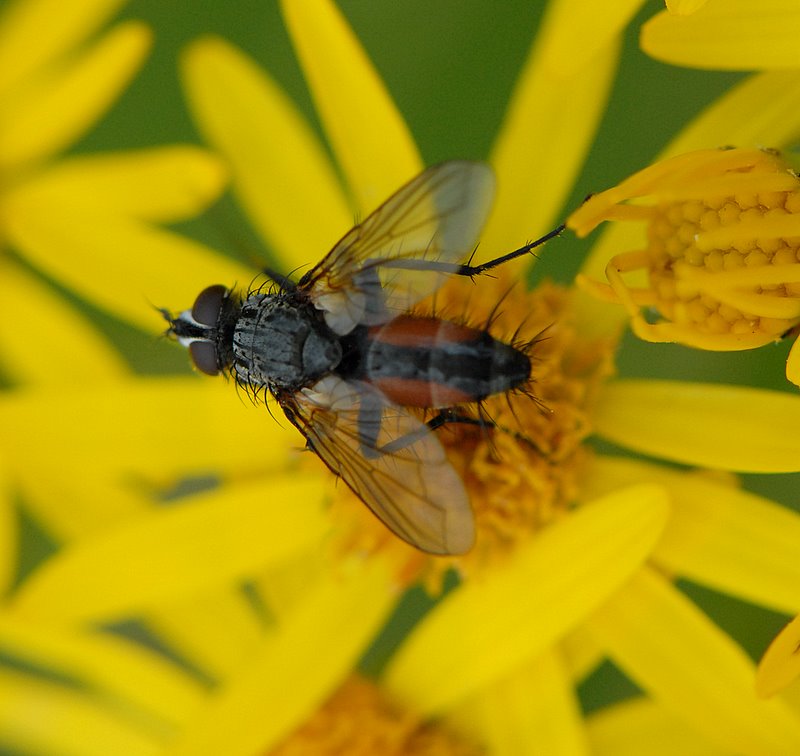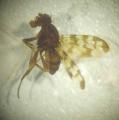Diptera.info :: Identification queries :: Diptera (adults)
Who is here? 1 guest(s)
|
Can anyone help me with the name
|
|
| GEERT |
Posted on 07-07-2007 13:51
|
|
Member Location: Posts: 18 Joined: 25.06.07 |
I found the fly near the channel, in Beernem Belgium, we have a very sandy ground here.( Tachinid ? )
GEERT attached the following image:  [103.64Kb] Edited by GEERT on 07-07-2007 13:58 |
| Susan R Walter |
Posted on 07-07-2007 16:09
|
|
Member Location: Touraine du Sud, central France Posts: 1802 Joined: 14.01.06 |
Eriothrix rufomaculatus Tachinidae I think.
Susan |
| ChrisR |
Posted on 07-07-2007 22:35
|
|
Super Administrator Location: Reading, England Posts: 7706 Joined: 12.07.04 |
I agree - Eriothrix rufomaculatus - listed as Eriothrix rufomaculata in the British key. Not sure where the subtle name change came in though as the rufomaculata variant isn't even listed as a synonym. |
| Tony Irwin |
Posted on 08-07-2007 11:25
|
|
Member Location: Norwich, England Posts: 7335 Joined: 19.11.04 |
The name Eriothrix comes from the Greek "erion" meaning "wool" and "thrix" meaning "hair", i.e. woolly-hair (perhaps not very apt, but that was Meigen's decision). It is a feminine noun, as I believe are all scientific genera ending in -thrix. Thus any adjectives used as specific names (such as rufomaculata) need to end in -a. If the species is transfered to a masculine genus, it will become rufomaculatus. It may seem picky, but those are the rules!
Tony ---------- Tony Irwin |
|
|
|
| Susan R Walter |
Posted on 08-07-2007 16:26
|
|
Member Location: Touraine du Sud, central France Posts: 1802 Joined: 14.01.06 |
Awww I originally spelt it as 'rufomaculata', but changed it because the gallery lists it as 'rufomaculatus'. I originally spelt it as 'rufomaculata', but changed it because the gallery lists it as 'rufomaculatus'.
Susan |
| Paul Beuk |
Posted on 08-07-2007 19:04
|
|
Super Administrator Location: Netherlands Posts: 19403 Joined: 11.05.04 |
rufiomaculatus was a commonly used spelling but correctly it is rufomaculata (following the British checklist).
Paul - - - - Paul Beuk on https://diptera.info |
| ChrisR |
Posted on 09-07-2007 13:14
|
|
Super Administrator Location: Reading, England Posts: 7706 Joined: 12.07.04 |
Just received the following definitive reply from Peter Tschorsnig: It sounds reasonable what Tony Urwin writes, "thrix" is feminine according to Greek dictionaries and "Eriothrix" should then also be feminine according to Art. 30.1.2. ICZN. Also Sabrosky, who was very correct in nomenclatural things, used the spelling "Eriothrix rufomaculata" in his Catalog of family group names of Diptera". So I fear I must change that too. Meigen 1803 did not state the gender of his genus, and he subsequently unfortunately did not use his own genus name (he placed the species of Eriothrix in the vast genus Tachina). Villeneuve (who presumably knew the Greek language) was obviously the first who described a new species under the name Eriothrix (Eriothrix experrectus Villeneuve, 1916), i.e. he used the gender as masculine, but I believe this has no nomenclatural consequence concerning the gender of the genus name. Masculine was also used by Kolomiets 1967 and by Mesnil in Lindner. Stein 1924 and Herting (from 1969 on) understood the name as feminine, but also Herting wrote "rufomaculatus" in his papers before 1969. Herting gave his catalogue version of 1984 to Dely-Draskovits as manuscript for the Hungarian catalogue. She deliberately changed the gender of Eriothrix back to masculine in the 1993 catalogue, and because I supposed that she had good reasons for that change I followed her with the names for the Central European key. I understood that Dely-Draskovits followed the Code, because she corrected also Benno's emendations in accordance to the ICZN. But, indeed, I did not ask her what her reasons were. Chris R. Edited by ChrisR on 09-07-2007 13:15 |
| Jump to Forum: |













